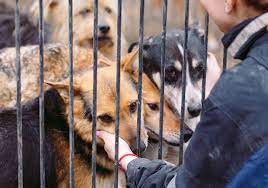Table of Contents
ToggleLifelong Companions
Dogs have been an irreplaceable part of human lives for thousands of years. Their contributions are immeasurable from their roles as loyal protectors and hunters to being cherished family members. Whether you’re looking for a playful partner, a work companion, or a source of emotional support, dogs are an unparalleled choice. Let’s explore why these furry friends are remarkable and how they enrich our lives.
Different Breeds of Dogs
The diversity among dog breeds is one of the species’ most fascinating aspects. Each breed has its unique size, temperament, and purpose, which makes it easier to find the perfect match for your lifestyle.
Working Dogs
Working dog breeds are known for their intelligence, strength, and loyalty. Many are trained as service animals, assisting those with disabilities, or serving as search-and-rescue dogs in emergencies. The German Shepherd is a popular breed in this category, widely recognized for its ability to follow commands and adapt to challenging environments. Learn more about working dog breeds and their traits here.
Toy Breeds
If you live in a smaller home or urban setting, toy breeds could be a perfect fit. These compact pups, like Pomeranians and Chihuahuas, pack a lot of personality despite their tiny size. Their affectionate nature and portability make them excellent companions for city dwellers.

Photo by Pixabay
Sporting Breeds
Lively and agile, sporting dogs thrive in active homes. Breeds like Labrador Retrievers and Spaniels are perfect for families who enjoy hiking or hunting. They’re known for their boundless energy and exceptional loyalty, making them ideal for outdoor enthusiasts.
Herding Dogs
If you have a farm—or just want a dog with a strong work ethic—herding breeds like Border Collies and Australian Shepherds are fantastic options. These dogs excel in agriculture, aiding in managing livestock, and showcasing unmatched intelligence.
Dog Care and Training
To ensure your dog thrives, it’s crucial to meet their physical, mental, and emotional needs. Proper care lets dogs give back tenfold through their love and loyalty.
Nutrition and Diet
Like humans, dogs need balanced diets tailored to their size, breed, and age. Puppies, adult dogs, and seniors all have different nutritional requirements. Feeding your dog high-quality food is key to maintaining their overall health and longevity.
Basic Training Techniques
Training your dog is not just about commands; it’s about building trust and understanding. Positive reinforcement, such as rewarding good behavior with treats, works wonders. If you’re new to training, this guide on basic dog training techniques offers great insights.
Mental and Physical Exercise
Dogs need regular exercise to stay fit and mentally stimulated. Activities like fetch, agility courses, and puzzle toys can keep them engaged. Active breeds especially require opportunities to burn off energy; otherwise, they might channel it into destructive behaviors.
Health Benefits of Owning a Dog
Dogs don’t just lift your mood—they also improve your health in more ways than one.
Improving Mental Health
Spending time with dogs can reduce anxiety and depression. Their unconditional love and companionship offer a sense of stability. According to studies on health benefits from pets, interacting with dogs even lowers stress hormone levels.
Physical Health Benefits
Owning a dog encourages daily physical activities like walks and playtime. Researchers link dog ownership to better cardiovascular health and lower blood pressure. Caring for your pet doesn’t just benefit them—it also keeps you healthier.
Social Interaction and Community
Dogs naturally bring people together, whether it’s meeting other owners at the park or participating in dog-focused events. They’re fantastic icebreakers and can help you feel more connected to your community. More insights into how dogs promote social opportunities are here.
Common Health Issues in Dogs
While dogs bring joy, they also come with responsibilities—including managing their health.
Genetic Conditions
Certain breeds are predisposed to genetic conditions. For instance, Bulldogs often deal with respiratory issues, while Golden Retrievers may experience hip dysplasia. Regular veterinary check-ups are vital for catching problems early. Explore breed-specific health concerns.
Preventive Care
Vaccinations, flea treatments, and routine veterinary visits are essential in keeping your pet healthy. Preventive care may feel like a chore, but it helps avoid larger issues in the future.
Conclusion
Dogs are more than pets—they’re family members, protectors, and lifelong companions. Whether you’re drawn to their wagging tails or their loving eyes, one thing is clear: life is better with a dog. By understanding their needs and characteristics, you ensure a happy, healthy relationship. If you’re considering bringing one into your life, prepare for a journey filled with unconditional love and joy.










![The Ultimate Guide to Road Tripping with Your Dog [2025 Update]](https://bellabeanupdate.com/wp-content/uploads/2025/05/pexels-photo-1143369-300x209.jpeg)




















